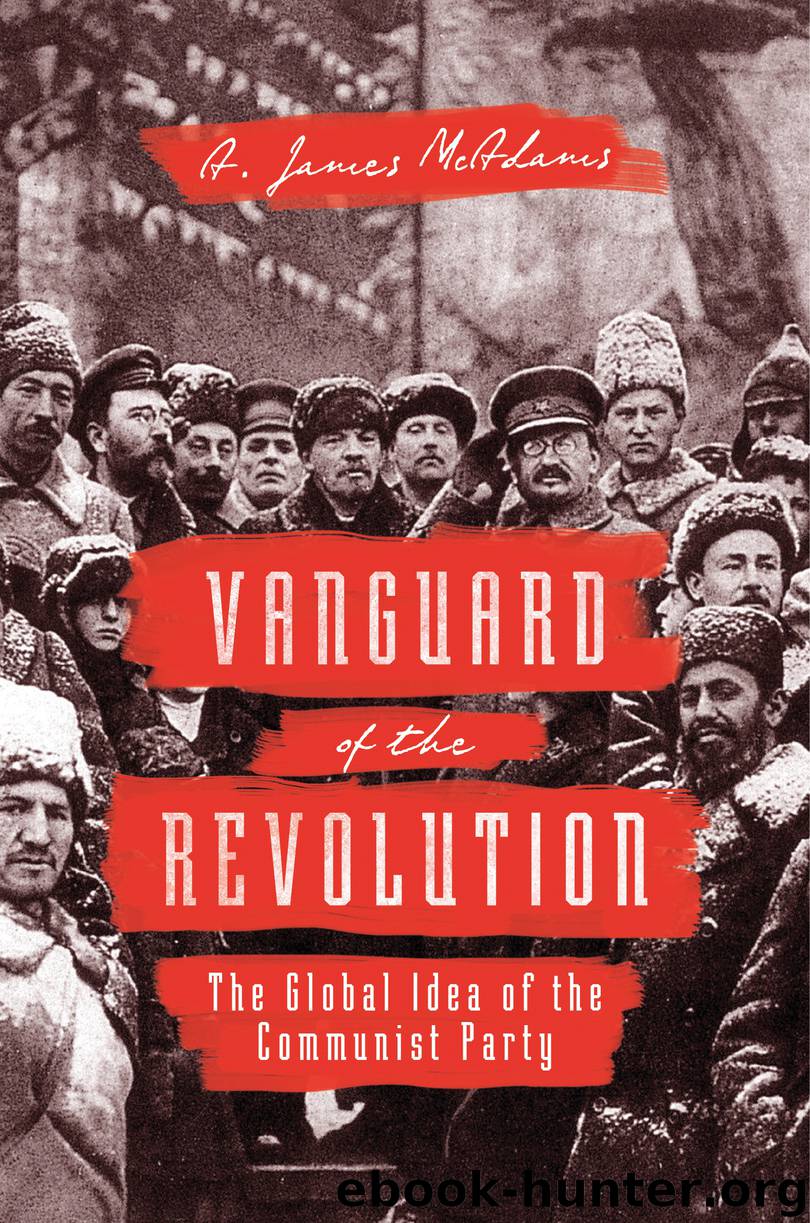Vanguard of the Revolution by A. James McAdams

Author:A. James McAdams
Language: eng
Format: epub
Publisher: Princeton University Press
CHAPTER 9
The Charismatic Leader and the Party
On December 2, 1961, Fidel Castro, the prime minister and later president of the Republic of Cuba, gave a characteristically spirited, three-hour speech on the radio station of the People’s University of Havana in which he announced a new political agenda. As Cuba moved into a higher stage of development, he declared, it required a strong, well-disciplined party. A party of the bourgeois type would not do. The latter could recruit millions of members, he explained, but as past experience had shown, this type of party would quickly be taken over by representatives of the old ruling class, “a bunch of politicians, a conglomerate of individuals,” who were more interested in money than in justice. Cuba, he asserted, needed a revolutionary Marxist party. The members of this organization would be absolute believers. They would be chosen on the basis of rigorous standards. They would represent all segments of society. Lest there be any doubt about his own convictions, Castro for the first time proclaimed himself a “Marxist-Leninist,” indeed, “one to the last day of my life.”1
Looking in from the outside, one might have assumed that Castro was completely committed to his new party. Created only four months earlier, this organization, the Integrated Revolutionary Organizations (ORI), bore a marked resemblance to the putatively representative bloc parties of postwar Central and Eastern Europe. It was composed not only of members of Castro’s rebel army, the 26th of July Movement, but also of Cuba’s long-existing communist party, the Popular Socialist Party (PSP), and the so-called Revolutionary Directorate March 13, an underground student organization. In March 1962, the ORI was renamed the United Party of the Cuban Socialist Revolution. Three years later, the full-fledged Communist Party of Cuba (PCC) was founded on October 3, 1965, with Castro as its first secretary. At last, Cuba seemed to be ruled by the same type of Leninist organization that could be found throughout the communist world.
If only Castro’s promises had been true! However, despite his repeated assurances in the address—in which he referred to himself revealingly as “we”—that he did not aspire to be “a Caesar” and that he had every intention of abiding by the norm of collective leadership, he would become precisely such a figure. From a historical perspective, this was a highly significant development. Long before the PCC’s creation, Cuba had already had an organized and far less personalistic communist party. The first Cuban Communist Party (CCP)2 was founded in 1925 and renamed the PSP in 1944. It was a stereotypical Leninist organization, obligated in every way to follow the instructions of the Comintern. For this reason, ironically, the CCP would be easier to characterize than would later be the case with Castro’s PCC. The CCP was not an insurrectionary party and its history was beset with missed opportunities. Up to the 1950s, its leaders could have articulated a realistic alternative to the consistent failure of the country’s middle-of-the road parties. But due to strategic mistakes and policies
Download
This site does not store any files on its server. We only index and link to content provided by other sites. Please contact the content providers to delete copyright contents if any and email us, we'll remove relevant links or contents immediately.
| Arms Control | Diplomacy |
| Security | Trades & Tariffs |
| Treaties | African |
| Asian | Australian & Oceanian |
| Canadian | Caribbean & Latin American |
| European | Middle Eastern |
| Russian & Former Soviet Union |
The Secret History by Donna Tartt(19083)
The Social Justice Warrior Handbook by Lisa De Pasquale(12190)
Thirteen Reasons Why by Jay Asher(8907)
This Is How You Lose Her by Junot Diaz(6885)
Weapons of Math Destruction by Cathy O'Neil(6279)
Zero to One by Peter Thiel(5798)
Beartown by Fredrik Backman(5751)
The Myth of the Strong Leader by Archie Brown(5507)
The Fire Next Time by James Baldwin(5441)
How Democracies Die by Steven Levitsky & Daniel Ziblatt(5218)
Promise Me, Dad by Joe Biden(5153)
Stone's Rules by Roger Stone(5087)
A Higher Loyalty: Truth, Lies, and Leadership by James Comey(4959)
100 Deadly Skills by Clint Emerson(4924)
Rise and Kill First by Ronen Bergman(4788)
Secrecy World by Jake Bernstein(4751)
The David Icke Guide to the Global Conspiracy (and how to end it) by David Icke(4717)
The Farm by Tom Rob Smith(4506)
The Doomsday Machine by Daniel Ellsberg(4489)
